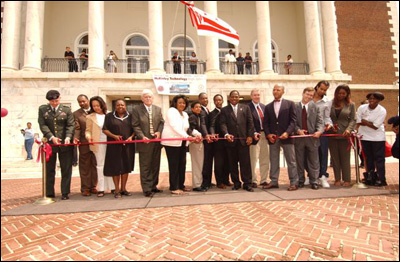School daze continued
 Dedication day at the reopening of McKinley Tech High School in 2004.
Dedication day at the reopening of McKinley Tech High School in 2004.Education activists are lobbying for a referendum on an amendment to the Home Rule charter of the District of Columbia, guaranteeing the right to a quality education for children. I don't like this for at least four reasons:
1. It should be understood as a matter of course that all District government agencies should provide excellent services.
2. It opens the District Government up (i.e., our taxpayer-generated revenue stream) to terrible legal liabilities.
3. The advocates for this charter amendment are not offering other amendments simultaneously to make the DC Public Schools manageable and accountable.
4. The advocates are not acknowledging "inputs" issues on the children-parent side of the equation.
Imposing requirements without changing the ability to execute or manage merely opens up the system for liability without allowing for substantive change.
A couple years ago, when Jonetta Rose Barras was still doing the Barras Report e-letter, we had a side e-conversation about her belief that the Mayor of DC should be able to take over the schools, comparable to what has happened in Chicago, where there is a clear line of accountability, and many many many many fundamental changes in the way things are run.
Fundamental change of municipal institutions seems to be anathema in DC.
That's why I find interesting the article in yesterday's Post, "Cropp Shifts On Control Of Schools," which starts out stating:
D.C. Council Chairman Linda W. Cropp said that if elected mayor, she would seek to take control of the city's failing public schools on a case-by-case basis, a shift from her position on the council, where she sought to maintain the school system's autonomy. In a policy paper released by her campaign last week, Cropp (D) laid out a plan to ask the council and Congress for authority to allow the executive branch to take over public schools whose test scores are below federal standards five years in a row.
I'm not sure this is the direction I'd go, but it's a start.
From "Understanding Achievement (And Other) Changes under Chicago School Reform," G. Alfred Hess, Jr., Educational Evaluation and Policy Analysis, Vol. 21, No. 1 (Spring, 1999) , pp. 67-83:
This article focuses on changes in student achievement in Chicago schools since the passage of the 1988 Chicago School Reform Act, and notes corresponding changes in funding, staffing, and leadership. At the center is a 5-year longitudinal study of 14 Chicago schools (10 elementary and 4 high schools) that were chosen through a stratified, random selection process. The schools were studied intensively, with particular concern for tracking the effects of changes in the governance structure of the schools resulting from the 1988 reforms. Changes in the principalship in these schools had a significant impact on achievement scores. The results of this study are linked to achievement changes that have occurred since the adoption of the 1995 amendments to the reform act that put primary responsibility for the administration of the school district in the hands of the city's mayor.
And from Educational Policy, Vol. 13, No. 4, 494-517 (1999), "Expectations, Opportunity, Capacity, and Will: The Four Essential Components of Chicago School Reform," G. Alfred Hess, Jr. From the abstract (emphasis added):
This article examines the school-based management reforms instituted in Chicago since 1988 and needed changes added to those reforms in 1995. After describing student achievement patterns between 1990 and 1998, the article examines three essential components of the reform effort: higher teacher expectations for students, the opportunity for schools to do things differently including additional resources, and addressing the capacity of teachers to dramatically improve the level of instruction. But school-based management alone was not enough to make improvement happen in all schools. A fourth component was needed. Accountability provisions, strengthened in 1995, addressed the lack of will among school staffs to undertake change and among students to be highly engaged in learning.
I am starting to believe that there needs to be a fundamental seizure and re-orienting, just like in Chicago. I disagreed with Jonetta before only because I didn't think that Mayor Williams had the perserverance to stay the course.
But accountability is a two-sided coin, something that I don't think DC educational advocates are willing to acknowledge. This is why I am really intrigued by the "positive deviance" model and its applicability to the school system here. See:
-- Positive deviance and DC Public Schools
-- Thinking about schools
-- School daze
-- If money fixed everything wouldn't we have a great society ...
-- Involving the community in school improvement, among others.
Still and all, even Chicago has a long way to go, see "Special Report: What's better and what's not," and "10 years of mayoral control: How far have we come? ," from the school improvement advocacy website, Catalyst Chicago School Reform.
And, oh yeah, why can't we learn from other places (also the "urban regime" political scientists have a big project looking at urban school system improvement, see "Urban educational challenges: Is reform the answer?")
Index Keywords: education



0 Comments:
Post a Comment
<< Home